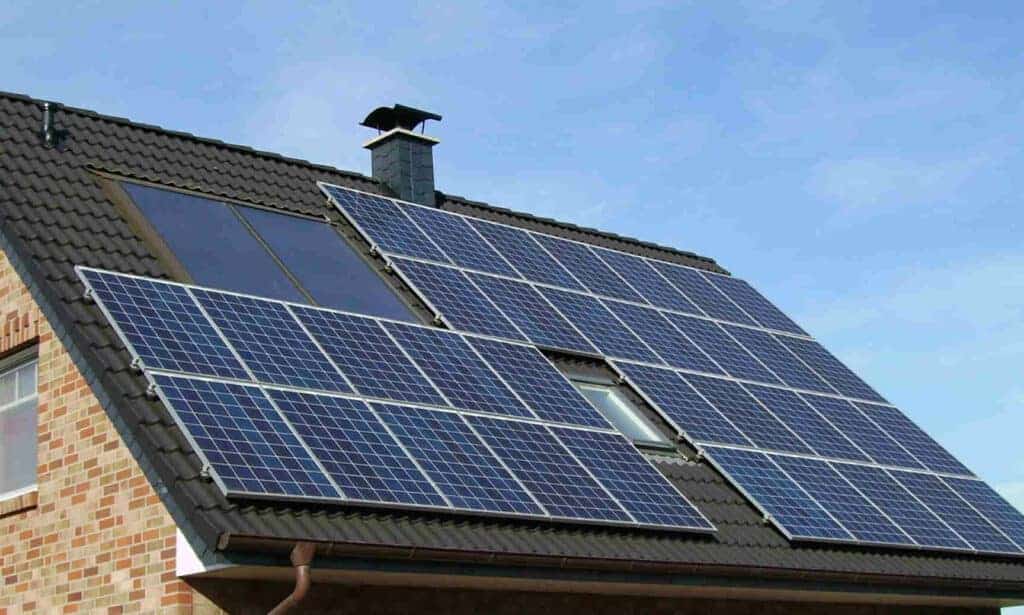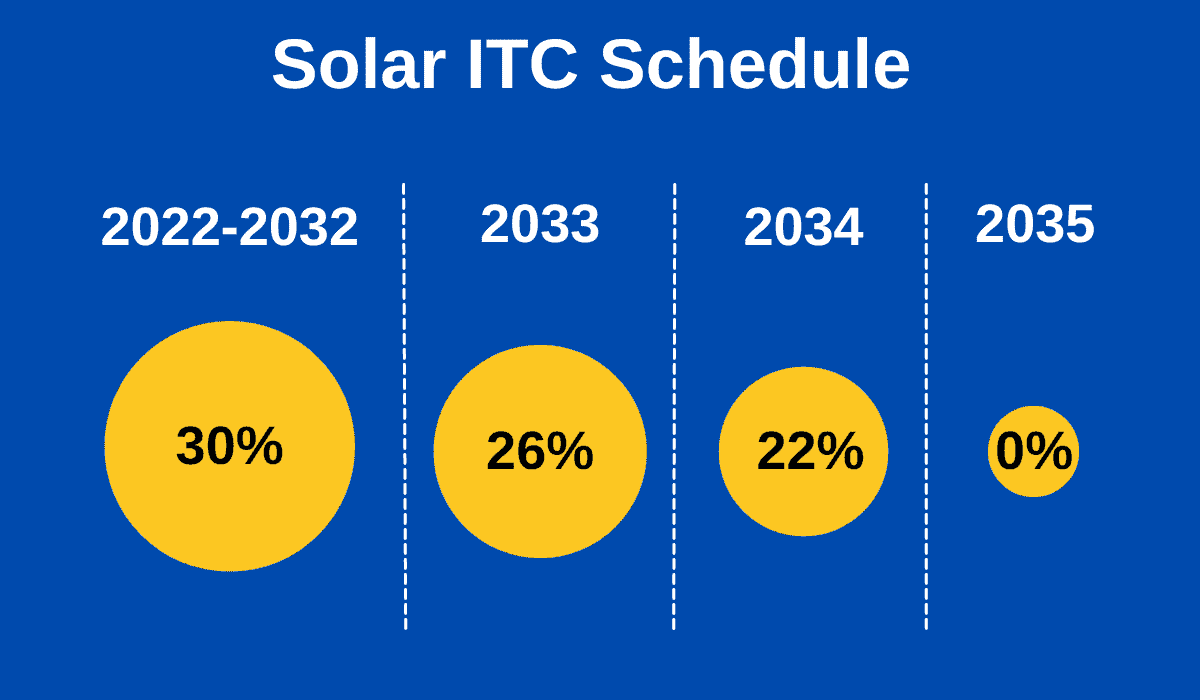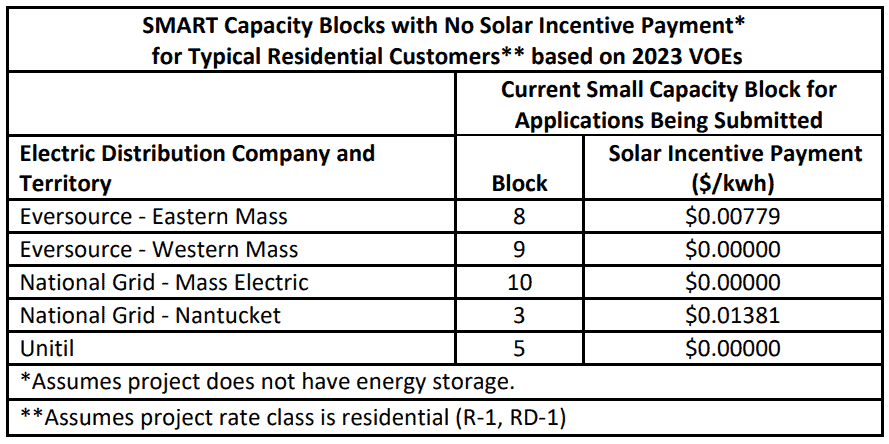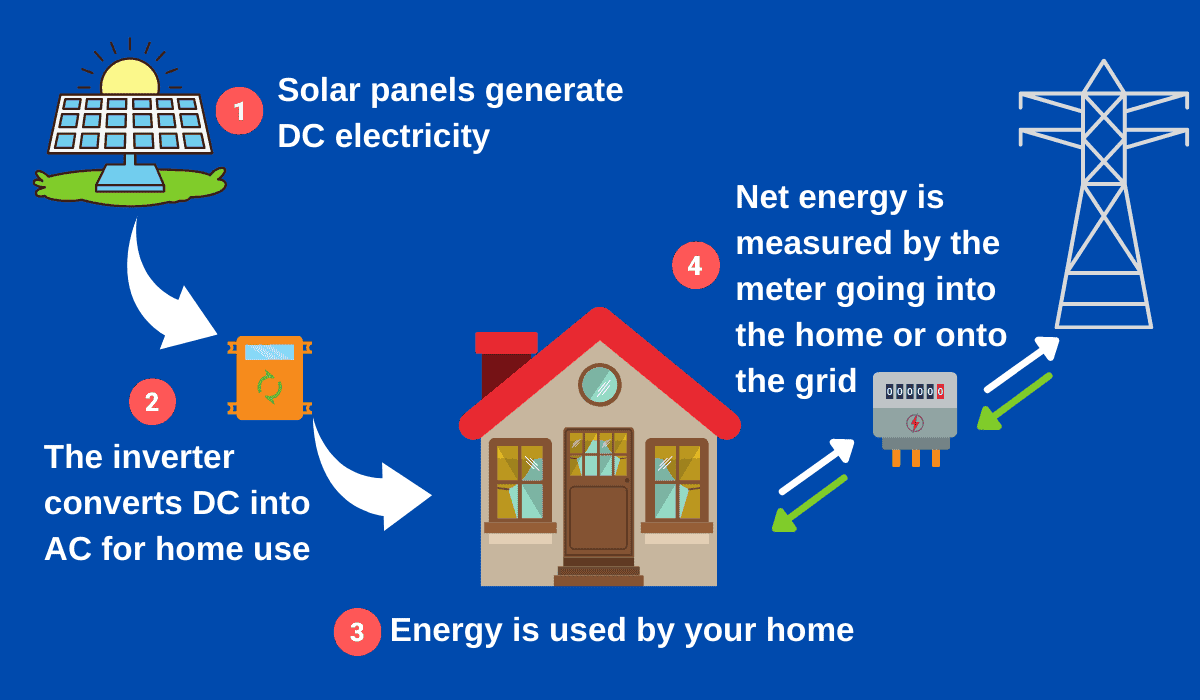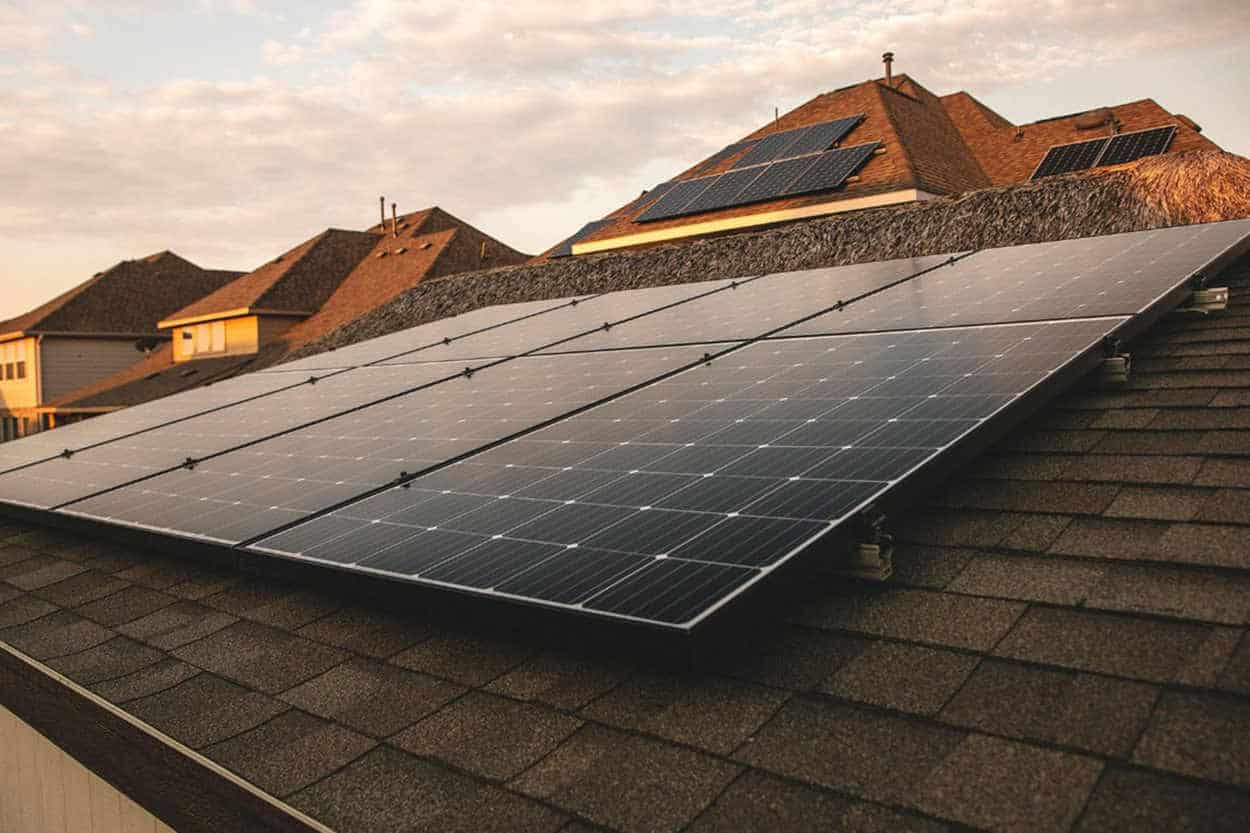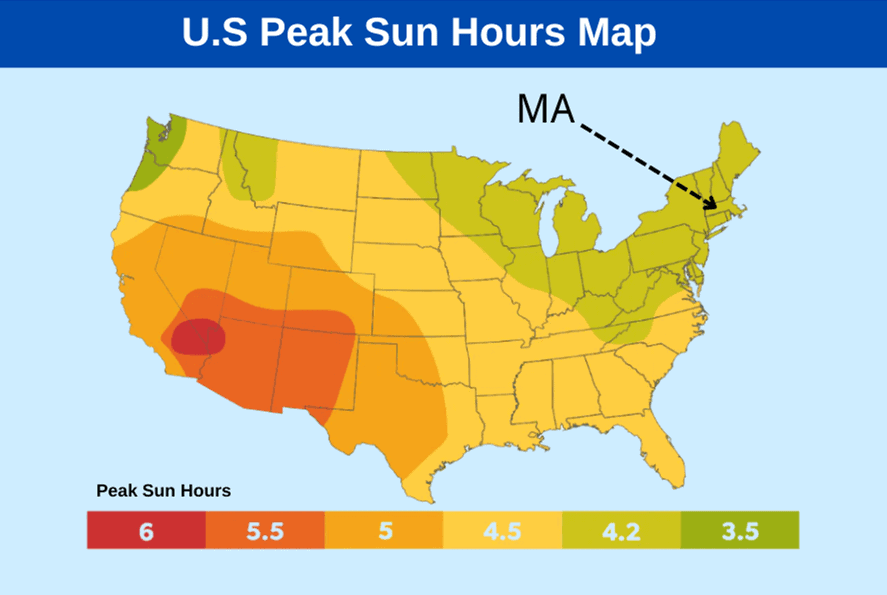Whether you’re environmentally conscious or looking for a way to cut your power bills, a solar panel is always a viable option. Even in Massachusetts, with short solar insolation hours, you can still generate your own power to offset the growing power prices.
Keep reading this full guide to learn more about the nuances of going solar in Massachusetts.
Massachusetts Solar Power Incentives
Federal Tax Credits
No matter where you live, you’re entitled to federal tax credits passed by Congress. Also referred to as an Investment Tax Credit (ITC), these tax credits are dollar-for-dollar reductions in your income tax. You get a percentage of your solar panel purchase and installation cost cut from your federal annual income tax.
Due to changes in the laws, there’s been some confusion about this percentage. Before 2021, solar panels installed in a given tax year were eligible for a 30% tax credit. This number was reduced to 26% for panels installed in 2020 and 2021.
The number was supposed to reach zero in 2024. However, new legislation increased the percentage to 30% and extended it until 2032. So, if you install your system any time between 2022 and 2032, you’ll get a tax reduction of 30% of the system’s total installation costs. The number will decrease to 26% and 22% in 2033 and 2034.
Here’s how the federal tax credits looked before the new legislation:
| Year | 2005-2022 | 2022 | 2023 | 2024 and later |
| Tax Reduction | 30% | 26% | 22% | 0% |
However, after the new legislation, the tax credit looks like this:
| 2022-2032 | 2033 | 2034 | 2035 |
| 30% | 26% | 22% | 0% |
Local Tax Credits
In addition to the federal tax credits, you should check whether you’re eligible for the Massachusetts local tax credit, Residential Energy Credit, part of an incentive for all renewable energy sources in the state.
You can get a credit on your income tax equal to 15% of all the expenses you paid for the solar panel up to $1000. Moreover, you can carry this credit over for up to three years.
To claim local and federal tax credits, you must own the system. In addition, some financing and rebate programs may reduce or negate the others. As a result, you need to talk everything through with your installer or provider to get the best deals in your area.
SMART Program
As the name suggests, Solar Massachusetts Renewable Target Program is a compensation plan exclusively devised for Massachusetts. It’s similar to the Solar Renewable Energy Credit (SREC), which is now limited to a few states and doesn’t accept new applicants. Massachusetts replaced the SREC to give solar panel owners more attractive incentives and cut their payback periods considerably short.
The SMART program may be complicated. The incentives depend on your utility and the capacity of your solar panel system. You’ll get paid based on the amount of electricity you generate for ten years.
The SMART program supports a total of 3200 MW of solar installations. This capacity is divided among three major utility companies: EverSource, Unitil, and National Grid. These companies have different incentive rates, so you may get paid differently.
Each company has a limited capacity for new applicants, and the compensations decrease with the number of participants. If a block gets full, new applicants are assigned to the next block with lower rates. So, you may end up in a block with zero compensation.
In addition, the price of electricity in your area is subtracted from the compensation amount, which also reduces what you finally receive.
However, you’re still not out of luck. You can add an energy storage battery or apply for net metering, which I’ll cover below.
Each company has a base compensation rate determined by factors such as term length and compensation block. To calculate your payment, you must subtract your local electricity cost from the compensation rate. If your solar panel is ground mounted, you’ll need to subtract another factor, the green-field subtractor.
For example:
- If you’re a National Grid client with a less-than-25 kW panel in compensation block 2, you’ll get $0.29881 of the base compensation rate.
- If your average electricity is $0.23/kWh, the final value will be 0.06881.
- Then, you should multiply this number by the monthly electricity your solar panel produces.
- If you generate 300 kWh of energy per month, you can make $206.43 from the SMART program.
Note. Depending on your area, you may not be eligible for the SMART program as it has been closed for new applicants in many areas. So, consult your local installer before diving in.
Net Metering
If you generate more energy than you consume during the day, you can sell it to your utility and get a one-to-one bill credit.
So, when you get power from your utility at night, you can pay for it through those credits. Massachusetts’s three major utility companies, Unitil, National Grid, and EverSource, offer these net metering incentives to panels with 25 kilowatts and lower capacities. If your utility is different, check if they provide such incentives.
ConnectedSolutions
Here’s another incentive offered to solar panel owners in Massachusetts. If you have a battery storage system, the utility draws power from your battery during peak hours and pays you at different rates.
For example, National Grid pays you up to $1500 a year, and Eversource gives you an average of over $1300 annually.
Tax Exemptions
If you use your solar panel as your home’s main or auxiliary power source, you’ll receive tax exemptions from the state.
A solar panel adds to the value of your home, which is not taxable according to this law. This 100% exemption is good for 20 years but only applies to the value added to your property.
You’re also exempt from the 6.25% sales and use taxes that are payable for many home items. This will significantly reduce your upfront costs.
Solar Panel Costs in Massachusetts
The cost of solar panels depends on a wide range of factors, including:
- Panel type and size.
- The installing company, their labor prices, and what they cover.
- Roof type and characteristics.
- Your electricity usage.
- Presence of trees.
Unfortunately, Massachusetts falls into the higher-price spectrum, with most companies charging between $3.3 for easy installations and $4.5 per watt for challenging projects.
Here’s an overview of what you can expect to pay for a single-family residential home according to data from the Massachusetts Department of Energy Resources:
- Average capacity: 9.4 kW
- Average cost per watt: $4.09
- Minimum cost per watt: $1.94
- Maximum cost per watt: $5.35
- Average total cost before incentives: $37,738
- Average payback period: 7.1 years
And if you live in a multi-family building with more than four units, your costs will be as below:
- Average capacity: 13.8 kW
- Average cost per watt: $3.67
- Minimum cost per watt: $2.64
- Maximum cost per watt: $5.67
- Average total cost before incentives: $48,710
- Average payback period: 6.5 years
Top 7 Solar Panel Installers in Massachusetts
1. SunPower
With three branches across Massachusetts — Boston, Woburn, and Cambridge— SunPower offers proprietary systems, including SunPower Equinox® solar systems, which can pair with SunPower® SunVault™ Storage to provide higher power efficiency.
You can have free online consultations and estimates to get quotes from the comfort of your home.
- Address: 101 Fayerweather St, Cambridge, MA 02138
- Phone Number: +1 833-383-4878
2. Trinity Solar
Trinity Solar is among the most experienced companies in Massachusetts, being in business since 1994 and operating in nine states. They give you a thorough explanation of all rebate and financing programs available federally and locally.
- Address: 4 Open Square Way 410, Holyoke, MA 01040
- Phone Number: +1 877-786-7283
3. Sun Run
With its varied financing options, Sun Run has something for every need and budget. You can get a monthly or full lease and a monthly loan plan to help you purchase your system.
Their 25-year warranty comes with Full service and Protection Plus plans that monitor and maintain your system proactively.
- Address: 150 Padgette St Unit A, Chicopee, MA 01022
- Phone Number: +1 833-324-5886
4. Palmetto Solar
Palmetto Solar is another reputable company with active branches in 23 states. It offers various financing options to fit your budget, including a loan and Power Purchase Agreement (PPA).
They also have a bumper-to-bumper warranty and a 25-year manufacturer warranty, allowing you to keep your system running without hiccups.
- Address: 84 Newbury St, Peabody, MA 01960
- Phone Number: +18882608262
5. Boston Solar
Boston Solar has been around for 11 years and is one of the best solar panel installers in the Commonwealth of Massachusetts, specializing in both residential and commercial systems. They offer various financing options, including Sungage Financial and Solar Loans.
You’ll get a 25-year manufacturer warranty and a 10-year quality warranty for your panels and inverters.
- Address: 12 Gill St #5650, Woburn, MA 01801
- Phone Number: +1 617-648-5601
6. Energy Pal
This award-winning company is based in Canada but offers services in many US states, including Massachusetts. You can get a free online quote on their website and talk with their consultants to receive competitive prices. They also offer solar loans and leases with different plans and options.
- Address: 8005 Financial Dr Suite 323, Brampton, ON L6Y 6A1, Canada
- Phone Number: +1 800-990-3725
7. Momentum Solar
Momentum Solar operates in 10 states, including Massachusetts. They offer tier 1 panels with the highest quality and a 25-year workmanship warranty. They also give you a detailed list of all incentives, rebates, and financing options, including loans, leases, and PPAs.
- Address: 11 Apex Dr #301b, Marlborough, MA 01752
- Phone Number: +18888904069
What To Consider When Installing Solar Panels in Massachusetts
Local Climate
Colder weather can reduce the efficiency of your solar panel. Plus, in the winter, you’ll get less strong sunlight even if you have fully sunny days. Massachusetts enjoys four seasons and a relatively cold, humid climate.
The state experiences above-average rainfall—47 inches per year. That means you’ll have fewer sunny days. July is the hottest month of the year, with the least rainfall. You can expect 2634 hours of sunlight in one year, which is relatively low compared to sunny states like Nevada and Colorado.
Peak Hours
Massachusetts is among the lowest-ranking states in terms of insolation rate, with an average of 3-4 hours a day.
To get a rough idea of how many solar panels you need, you should first decide how many kilowatts of electricity your home consumes daily. Then, divide it by the number of peak hours and work out the number of panels depending on their capacities.
For example, if you need 20kWh of electricity daily and have three daily peak hours, you must generate around 7kWh an hour. A 350W panel generates roughly 1kW a day, considering three hours of sunlight in your area. So, you’ll need 20 panels for your roof to cover your consumption.
Naturally, you should go higher if you want to sell to your local utility company.
Installation Angle
According to the Massachusetts Clean Energy Center, the best tilt for solar panels in the state is 30 to 45 degrees, but the 30-35 degree range is more common.
The exact degree depends on your location. For example, 35.3° is the best for Boston and Cambridge, while 35.2 and 35.4 are optimal for Worcester and Lynn. In all cases, your panels should be facing south.
Summary
If you think Massachusetts isn’t a good candidate for going solar, you need to think twice. By consulting the local installers and reviewing all the available options, you can find the best system that matches your budget and roof design.

